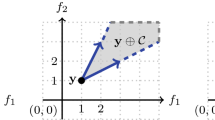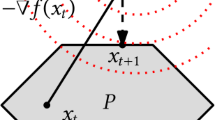Abstract
Noise is present in many real-world continuous optimization problems. Stochastic search algorithms such as Evolution Strategies (ESs) have been proposed as effective search methods in such contexts. In this paper, we provide a mathematical analysis of the convergence of a (1+1)-ES on unimodal spherical objective functions in the presence of noise. We prove for a multiplicative noise model that for a positive expected value of the noisy objective function, convergence or divergence happens depending on the infimum of the support of the noise. Moreover, we investigate convergence rates and show that log-linear convergence is preserved in presence of noise. This result is a strong theoretical foundation of the robustness of ESs with respect to noise.
Similar content being viewed by others
References
Nissen, V., Propach, J.: On the robustness of population-based versus point-based optimization in the presence of noise. IEEE Trans. Evol. Comput. 2(3), 107–119 (1998)
Arnold, D.V., Beyer, H.-G.: A comparison of evolution strategies with other direct search methods in the presence of noise. Comput. Optim. Appl. 24, 135–159 (2003)
Jin, Y., Branke, J.: Evolutionary optimization in uncertain environments—a survey. IEEE Trans. Evol. Comput. 9(3), 303–317 (2005)
Arnold, D.V.: Noisy Optimization with Evolution Strategies. GENA. Kluwer Academic, Dordrecht (2002)
Suganthan, P.N., Hansen, N., Liang, J.J., Deb, K., Chen, Y.P., Auger, A., Tiwari, S.: Problem definitions and evaluation criteria for the CEC 2005 special session on real-parameter optimization. Technical Report, Nanyang Technological University, Singapore and KanGAL Report Number 2005005 (Kanpur Genetic Algorithms Laboratory, IIT Kanpur), May 2005
Hansen, N., Finck, S., Ros, R., Auger, A.: Real-parameter black-box optimization benchmarking 2009: noisy functions definitions. Technical Report RR-6869, INRIA (2009)
Schumer, M., Steiglitz, K.: Adaptive step size random search. IEEE Trans. Autom. Control 13, 270–276 (1968)
Rechenberg, I.: Evolutionstrategie: Optimierung Technisher Systeme nach Prinzipien des Biologischen Evolution. Fromman-Hozlboog Verlag, Stuttgart (1973)
Schwefel, H.-P.: Collective phenomena in evolutionary systems. In: Checkland, P., Kiss, I. (eds.) Problems of Constancy and Change—The Complementarity of Systems Approaches to Complexity. Proc. 31st Annual Meeting, vol. 2, pp. 1025–1033. Int’l Soc. for General System Research, Budapest (1987)
Hansen, N., Ostermeier, A.: Completely derandomized self-adaptation in evolution strategies. Evolut. Comput. 9(2), 159–195 (2001)
Auger, A., Hansen, N.: Reconsidering the progress rate theory for evolution strategies in finite dimensions. In: Proceedings of the Genetic and Evolutionary Computation Conference (GECCO 2006), pp. 445–452. Assoc. Comput. Mach., New York (2006)
Jebalia, M., Auger, A., Liardet, P.: Log-linear convergence and optimal bounds for the (1+1)-ES. In: Monmarché, N., et al. (eds.) Proceedings of Evolution Artificielle (EA’07). LNCS, vol. 4926, pp. 207–218. Springer, Berlin (2008)
Bienvenüe, A., François, O.: Global convergence for evolution strategies in spherical problems: some simple proofs and difficulties. Theor. Comput. Sci. 306(1–3), 269–289 (2003)
Auger, A.: Convergence results for (1,λ)-SA-ES using the theory of φ-irreducible Markov chains. Theor. Comput. Sci. 334(1–3), 35–69 (2005)
Jägersküpper, J.: Analysis of a simple evolutionary algorithm for minimization in euclidean spaces. Theor. Comput. Sci. 379(3), 329–347 (2007)
Jägersküpper, J.: Rigorous runtime analysis of the (1+1)-ES: 1/5-rule and ellipsoidal fitness landscapes. In: Foundations of Genetic Algorithms: 8th International Workshop, FoGA 2005. LNCS, vol. 3469, pp. 260–281. Springer, Berlin (2005)
Arnold, D.V., Beyer, H.-G.: Efficiency and mutation strength adaptation of the (μ/μ I ,λ)-ES in a noisy environment. In: Schoenauer, M., et al. (eds.) Proceedings of Parallel Problem Solving from Nature—PPSN VI. LNCS, vol. 1917, pp. 39–48. Springer, Berlin (2000)
Arnold, D.V., Beyer, H.-G.: Investigation of the (μ,λ)-ES in the presence of noise. In: Proceedings of 2001 IEEE Congress on Evolutionary Computation, pp. 332–339. IEEE Press, New York (2001)
Beyer, H.-G.: The Theory of Evolution Strategies. Natural Computing Series. Springer, Berlin (2001)
Arnold, D.V., Beyer, H.-G.: Local performance of the (1+1)-ES in a noisy environment. IEEE Trans. Evolut. Comput. 6(1), 30–41 (2002)
Jebalia, M., Auger, A.: On multiplicative noise models for stochastic search. In: Rudolph, G., Jansen, T., Lucas, S., Polini, C., Beume, N. (eds.) Proceedings of Parallel Problem Solving from Nature (PPSN X). LNCS, vol. 5199, pp. 52–61. Springer, Berlin (2008)
Rudolph, G.: Convergence Properties of Evolutionary Algorithms. Verlag Dr. Kovac, Hamburg (1997)
Arnold, D.V.: Optimal weighted recombination. In: Foundations of Genetic Algorithms, vol. 8, pp. 215–237. Springer, Berlin (2005)
Meyn, S.P., Tweedie, R.L.: Markov Chains and Stochastic Stability. Springer, New York (1993)
Nakama, T.: Theoretical analysis of genetic algorithms in noisy environments based on Markov model. In: Proceedings of the Genetic and Evolutionary Computation Conference (GECCO 2008), pp. 1001–1008. Assoc. Comput. Mach., New York (2008)
Nakama, T.: Markov chain analysis of genetic algorithms in a wide variety of noisy environments. In: Proceedings of the Genetic and Evolutionary Computation Conference (GECCO 2009), pp. 827–834. Assoc. Comput. Mach., New York (2009)
Beyer, H.-G.: Toward a theory of evolution strategies: some asymptotical results from the (1,+λ)-theory. Evolut. Comput. 1(2), 165–188 (1993)
Hansen, N., Niederberger, A., Guzzella, L., Koumoutsakos, P.: A method for handling uncertainty in evolutionary optimization with an application to feedback control of combustion. IEEE Trans. Evolut. Comput. 13(1), 180–197 (2009)
Hansen, N.: Benchmarking a BI-population CMA-ES on the BBOB-2009 noisy testbed. In: Raidl, G., et al. (eds.) Workshop Proceedings of the GECCO Genetic and Evolutionary Computation Conference, pp. 2397–2402. Assoc. Comput. Mach., New York (2009)
Teytaud, O., Gelly, S.: General lower bounds for evolutionary algorithms. In: 10th International Conference on Parallel Problem Solving from Nature (PPSN 2006), vol. 4193, pp. 21–31. Springer, Berlin (2006)
Williams, D.: Probability with Martingales. Cambridge University Press, Cambridge (1991)
Author information
Authors and Affiliations
Corresponding author
Rights and permissions
About this article
Cite this article
Jebalia, M., Auger, A. & Hansen, N. Log-Linear Convergence and Divergence of the Scale-Invariant (1+1)-ES in Noisy Environments. Algorithmica 59, 425–460 (2011). https://doi.org/10.1007/s00453-010-9403-3
Received:
Accepted:
Published:
Issue Date:
DOI: https://doi.org/10.1007/s00453-010-9403-3




